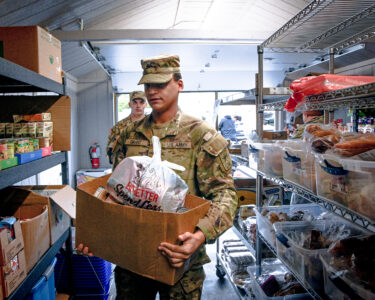Health care professionals share tips for affordable nutrition
Food scarcity is on the mind of many, with the status of SNAP benefits in limbo as the government shutdown drags on.
To help those affected stretch their dollar, two Geisinger medical personnel offer tips they commonly offer to their patients.
“If the government remains shut down and SNAP benefits are put on hold, it can be a concern, because some of my clients do report that they have food insecurity,” said Dr. Jennifer Powers, a registered dietitian nutritionist lead and certified diabetes care and education specialist., working in the outpatient Geisinger Clinical Nutrition Department.
“There’s a big possibility that food insecurity is going to increase, so one way I can help is to give tips about what you can do to make your dollars stretch at the grocery store, which is already a challenge, because prices have increased,” she said.
One way to save money is by putting together a list prior to a trip to the grocery store, which she said can reduce or eliminate impulse buying.
“Take inventory of your pantry, your refrigerator and your freezer, and maybe even work on a rough menu plan for the week so you know what you need from the store and what is available in your house already, so that you’re not buying unnecessary items,” she advised, adding that shoppers should also avoid doing so while hungry.
Coupons are a great tool in cost-cutting, however, Powers stressed that it’s important to use them only if the item being used is the cheaper option and something that is regularly used in the household.
Examining store flyers for the best deals and planning a shopping trip accordingly will help save on both groceries and gas mileage, Powers stressed.
“Bulk up on foods that are healthier choices and have a longer shelf life, so some suggestions for those would be nut butters, like peanut or almond butter and low sodium or no added salt canned vegetables,” Powers said, adding that canned vegetables can be rinsed in order to remove excess salt.
A common misconception Powers wishes to dispel is that canned fruit and vegetables are less nutritious than their fresh counterparts.
“That’s not true. They’re canned at the peak of freshness,” she said, adding that choosing fruit canned in its own juice or water is the best option, as opposed to a heavy syrup.
Powers also suggests purchasing shelf-stable items such as canned fruits and vegetables, low-sugar cereals, plain brown or wild rice and whole wheat or whole grain pasta.
Purchasing store brand items and grading cheese from blocks, as well as buying in bulk and freezing the unused portions are additional ways to save money, Powers said.
Substituting ground chicken or turkey in place of ground beef could save up to $3 per pound, she added, also noting that the higher in fat content the meat is the more that is wasted in the form of grease that either gets drained or runs off the food.
Recipes with ground beef can also be bulked up to utilize less beef by adding in diced red peppers, celery and mushrooms and whole vegetables,” Powers said, noting that they are less expensive than ground beef, and add nutritional value.
Fruits and vegetables approaching their sell-by date are often marked down and can be frozen for later usage in things such as banana bread or smoothies.
While many adults are stressed over the uncertainty, parents of young children may be feeling that strain even more.
“I think anybody who relies on services like this is always concerned about stretching their dollar and making sure that they have enough food to feed their family. And I think this is just a heightened period of stress. So it’s something that we try to be pretty conscious of when we’re talking to families most of the time, but especially right now,” said Casey Campbell, a registered dietitian with Geisinger, who specializes in pediatrics.
Though the WIC program is not expected to be impacted by the shutdown, with money across the board being tight, Campbell advises parents to not take chances where baby formula is concerned.
“We really advise against people trying to dilute formula to stretch the supply. We really encourage and recommend that they follow the can instructions for mixing because that mixing is so specific for maintaining specific electrolytes and calories and protein and fluid and everything for infants,” Campbell said, also discouraging the usage of social media trends for homemade formulas.
“Infant formulas are made so specifically and are highly regulated to make sure they’re providing good nutrition and electrolytes, and when we’re making things at home, that can definitely cause some imbalances,” she stressed.
If costs for fumula are an issue, Campbell suggests switching to a store brand, which are generally more cost effective.
“It has the same nutrition. They’re just as regulated. Anything that’s sold at a store in the U.S. is pretty tightly regulated, so we would consider it comparable to a name brand,” she said.
“If your baby’s on any kind of specialty formula, anything that’s sensitive or hypo-allergenic and you’re not sure what another brand or store brand equivalent would be, definitely reach out to either your pediatrician or dietitian,” Campbell advised.
One area Campbell is comfortable with at-home options is pureed foods.
“Baby foods or purees or jars and pouches, obviously, they’re very convenient, but they’re probably going to be on the more expensive side. So you can utilize frozen fruits and vegetables, canned fruits and vegetables and blending or mashing at home,” she said, while noting that parents should be wary of additives.
For those ages consuming regular table foods, Campbell advises utilizing school services as much as possible.
“Many schools have breakfast options as well as lunch options and things after school, so try to take advantage of foods that are available for kids through school as much as you can,” she said.
Campbell and Powers both promote the usage of www.neighborlypa.org, a free website that assists users with finding resources such as food pantries, housing assistance, childcare, transportation, utility assistance, healthcare, financial assistance and other needs.
“There’s like, there’s a significant amount of information on that website to help people with a variety of different things,” Powers said.
“And don’t hesitate to reach out to your pediatrician or dietitian. We have access to resources. We have access to samples of things. We have relationships with different places in the community, so if you’re really struggling or you’re not sure where to look, connect with your health care provider,” Campbell said.
“On the flip side, if people are looking for ways to help out and ways to donate, if they have the means to, donating to food banks and food pantries is going to be important right now,” Campbell added.
“When it comes to infant formula, I would suggest people contact their specific food pantry or food bank because not all of them can take infant formula because of some of the rules and regulations around it, but most of them will accept cash donations, and they have different kinds of purchasing power for then being able to purchase things like that from suppliers,” she said.
“If you’re fortunate enough to be able to donate at a local food pantry or food bank right now, consider donating money. This allows the food bank or food pantry to buy what they need,” Powers said.
“If it’s food, they can buy it at their volume discount, or maybe they need gas for their delivery truck or to cover their facilities, insurance bill or pay for freezer repair,” she continued.
“If you decide you would prefer to donate food, ask the organization what they need. Many organizations have a wish list on their website. When in doubt, know that shelf stable protein products are almost always needed,” she said.
“Currently, the Academy of Nutrition and Dietetics is partnering with Feeding America to raise funds, awareness, education and opportunities to help those who are or will be in need. Their post on Facebook states that $1 will help to provide at least 10 meals to neighbors experiencing hunger. So a donation of just $10 could impact the lives of 100 people,” Powers added.




